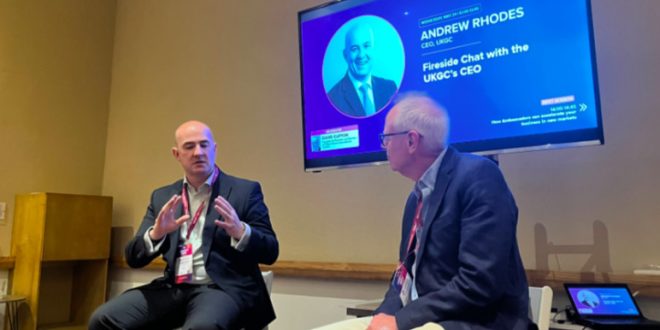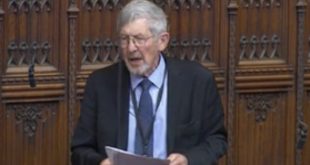
Licensing Expert David Clifton reflects in his one-on-one interview with Gambling Commission CEO Andrew Rhodes at last month’s CasinoBeats Summit in Malta. Rhodes is the key stakeholder in how the Gambling Review’s White Paper will conclude on the unspecified policies of affordability, financial vulnerability, frictionless checks and more…
In my last ‘Licensing Expert’ article for SBC News, I suggested that misapprehensions about the issue of ‘affordability’ need to be cleared up.
That was before publication on 27 April of the UK Government’s Gambling Act Review White Paper, entitled ‘High stakes: gambling reform for the digital age’. So, have the above misapprehensions been cleared up? Read on for my views on that!
For many, the headline-grabbing news has been the White Paper assurance that neither the Government nor the UK’s Gaming Commission will be setting “a blanket rule on how much of their income adults should be able to spend on gambling”.
Contrary to arguments advanced by public health lobbyists in the long lead-up to the White Paper, the Government instead intends to adhere to the principle that “people should be free to spend their money how they see fit”.
Frictionless Checks
To counter-balance this principle, the White Paper proposes inclusion within the UKGC’s Licence Conditions and Codes of Practice of more prescriptive rules on when online gambling operators must check customers’ financial circumstances for signs that their losses are harmful. The purpose is to target the very same three key risks to which I referred in my last article, namely (a) so-called ‘binge gambling’, (b) significant unaffordable losses over time and (c) financially vulnerable customers. One only has to read the UKGC’s Skill On Net Limited Public Statement (published on 23 May) to see yet further examples of the regulator having identified all too clearly such situations arising in practice.
As most readers will now be aware, subject to the outcome of a UKGC consultation due to commence in ‘Summer 2023’ (in practice, likely to be in mid-July according to comments made to me by the UKGC’s CEO, Andrew Rhodes, at the CasinoBeats Summit in Malta on 24 May), it is proposed that new rules will require ‘unintrusive’ and ‘light touch’ background checks to be carried out on customers at ‘moderate spend’ levels (i.e. a £125 net loss within a month or £500 net loss within a year).
These would then escalate to more detailed ‘enhanced’ (but nevertheless ‘frictionless’) checks that would be intended to “provide much greater insight into a customer’s financial position”. These checks would be triggered for higher levels of spend that may serve to indicate ‘harmful binge gambling or sustained unaffordable losses’ (i.e. a £1,000 net loss within a day or £2,000 net loss within 90 days, with these thresholds halved for customers in the 18 to 24 age group).
Time will tell exactly what ‘frictionless’ means but, as matters presently stand, the Government intends that the above checks will be “conducted online by credit agencies or through other means such as open banking in the first instance”, so that they will not interrupt the customer journey unless they raise concerns that merit deeper investigation.
In theory, that sounds like an encouragingly practical solution that, in a prefect world, would provide a level playing field for all operators whilst not at the same time propelling thousands of customers to the illegal black market.
However, this change is clearly not going to happen overnight because there is clearly a huge amount of work still to be done between the UKGC, UK Finance, the Information Commissioner’s Office and credit reference agencies (‘CRAs’).
Indeed, doubts are already being raised CRAs will be able to fulfil the following White Paper ambition, namely to “provide frictionless enhanced checks for 80% of customers who hit the enhanced spending check thresholds, with half the remainder subject to semi-agreeable checks (e.g. open banking) and the other half (10% of all those who hit the higher thresholds) subject to disagreeable checks”.
It’s a valid concern because the Government has made clear in the White Paper that the sharing of credit reference agency data will only occur once safeguards are in place to ensure that such data will only be used for legitimate purposes, such as harm prevention, rather than it being used to inform marketing tactics or disadvantage successful customers. As a consequence of that, the UKGC will only consult on making data sharing on high-risk customers mandatory for all remote operators “once a suitably effective and secure platform is in place”.
Single Customer View
For the reasons I set out below, it seems that similar technical considerations will apply to the ‘Single-Customer View’ (‘SCV’) initiative, described by some in the past as potentially a ‘silver bullet’ solution in terms of providing to a UK-licensed gambling operator data regarding a customer’s activity across all operators, whilst keeping the customer’s data secure. Indeed Andrew Rhodes acknowleged last October that “this has the potential to be a significant step change in improving the safety of gambling”.
An industry-led SCV trial started in April this year but little outside very guarded comment from the Betting & Gaming Council (‘BGC’) has been known about the details of this. It is therefore helpful to read an informative update in the White Paper. We now know that the trial involves a select number of participating operators sharing information on individuals who have had their accounts closed following disclosures of serious gambling-related harm. As part of the trial, codes of practice are being developed to ensure that operators respond appropriately when they are notified of customers in this situation.
Looking slightly ahead, the White Paper explains that “following evaluation later this year, the intention is to expand the system to consider customers who are showing other indicators of harm with one operator which might necessitate coordinated action with other operators”.
Looking further ahead, it says: “The government and Commission will review the outcomes of these trials, including whether the right individuals were caught by the system, whether the criteria above identifies enough gamblers at risk of harm, whether operators respond appropriately when information is shared, and whether an effective technical solution has been developed. If necessary, we will mandate a different or more comprehensive approach to ensure the system meets our objectives in a proportionate and safe way. Once we are satisfied, the Commission will consult on any outstanding details and on requiring all remote operators to integrate with the system”.
It adds: “The new requirements will include provisions to ensure any consumer data is effectively protected and only used for the purposes of harm prevention. We are clear it must never be deployed to further commercial objectives such as through marketing, customer segmentation or identifying winners”.
What happens to Affordability?
Taking into account the White Paper proposals I have outlined above, what will happen to the notion of ‘affordability’ that has been at the core of UKGC thinking for the last four years and about which a good deal of confusion still exists, as I explained in my last article?
The answer presently appears to be “not a lot”. I certainly can’t envisage that the word ‘affordability’ will disappear from the regulator’s vocabulary any time soon, although it’s likely that the phrase ‘financial vulnerability’ will come much more to the fore.
What exactly does that latter phrase mean?
Financial Vulnerability
Let’s start with the UKGC’s definition of ‘vulnerability’ in its recently published ‘Evidence gaps and priorities 2023 to 2026’ document. It’s quite a long definition so please stick with it to the end. It reads as follows:
“A customer in a vulnerable situation who, due to their personal circumstances, is especially susceptible to harm, particularly when a firm is not acting with appropriate levels of actions they should take as a result. Although not an exhaustive list, we do for regulatory purposes consider that this group will include people who spend more money and/or time gambling than they want to, people who gamble beyond their means, and people who may not be able to make informed or balanced decisions about gambling (for example because of health problems, learning disability, or substance misuse relating to alcohol or drugs)”.
That’s quite a wide-encompassing set of circumstances to take on board. It’s not surprising that, within that same document, the UKGC admits that: “even defining vulnerability can be challenging, as a consumer’s vulnerability is not necessarily static”.
If that is what constitutes ‘vulnerability’, what then is ‘financial vulnerability’? Is it a sub-category of ‘vulnerability’ or something else completely?
The White Paper describes ‘financial vulnerability’ as a situation “where customers are unable to absorb additional financial strain incurred through gambling, even at modest levels of spend”. In its Advice to the Government in relation to the Gambling Act Review (published on the same day as the White Paper), the UKGC talks in terms of it constituting information “that shows when customers are particularly financially vulnerable and likely to be harmed by their level of gambling”.
I asked Andrew Rhodes at the CasinoBeats Summit in Malta if he could clarify the meaning of this same phrase. He answered me as follows: “The way the White Paper defines financial vulnerability in relation to a threshold is a very basic set of indicators, bankruptcy, CCJs, someone who is likely to be at much higher financial risk with their financial position.”
He added: “You’re never going to get to a definitive answer and the argument has been quite reductive in recent times because people will say the Commission says that if you’ve got less money at the end, then you might be harmed and you might be vulnerable. That’s not a serious argument really. This is about where the level of money that you have parted company with; is that at a level that will be likely to cause you harm and you are vulnerable to that harm.
Let’s hope that some greater clarity emerges from the forthcoming UKGC consultations due to commence next month. However, that’s not necessarily guaranteed bearing in mind that, as reported by CasinoBeats on 25 May, Rhodes went on to forecast a “fierce debate about vulnerability because to an extent this is in the eye of the beholder. It is quite easy in many ways when you get a case that you look at and everybody goes ‘that’s awful’ – for everybody to see in hindsight that’s awful – it is much harder to define that when individual experiences can differ so greatly and circumstances can differ so greatly.”
However, as matters stand, it appears that more than merely ‘unintrusive/light-touch’ and ‘frictionless/enhanced’ checks of the type described above will be required from customers in what the White Paper calls ‘last resort’ circumstances “where it is necessary to complete an assessment”, as long as “the use of any data gathered through such checks will be restricted to assessing financial risk and indicators of financial distress”.
Back to Affordability
I asked Andrew Rhodes whether the White Paper proposals in this respect would have any effect on current UKGC policy implementation including in relation to affordability checks. He answered: “In terms of our expectations now, they are unchanged. We expect operators to have policies and processes in place to make sure they identify customers who may be at risk and they take appropriate steps in relation to that”.
In terms of identifying sufficiently broad customer SG risk profiles, that will still include consideration of the seven categories of ‘indicators of harm’ under the considerably strengthened LCCP remote customer interaction rules that came into force in September 2022 and February 2023.
In terms of appropriate steps to be taken, this raises once again the commonly posed questions (a) what are the appropriate financial thresholds at which operators should conduct affordability checks and (b) what evidence should be sought by operators when doing so?
On (a) thresholds, Rhodes accepted that this is a ‘really difficult issue’ but referred to multiple responses to UKGC consultations where operators have said the industry is best placed to decide how to set appropriate thresholds because they know their customers and they know their businesses. As a consequence, the UKGC believes that operators have got to decide themselves where they want to be on the spectrum of thresholds at which affordability checks are carried out for customers of their businesses. This is in line with his ICE speech in February, when he said “it is for operators to set limits themselves based on their customer types, business and risks”. At the CasinoBeats Summit, he added that, in so doing, they should bear in mind “you still have an obligation to figure out whether, whatever your threshold is, if someone goes beyond it, are they safe to do so?”.
On (b) evidence of affordability, and as mentioned in my last article, Rhodes has previously told the ‘Racing Post’ that the UKGC does “not require operators to get payslips or bank statements, it will be up to the operator how they go about any check they feel they need to make.” However, when I raised a question on this at CasinoBeats, he acknowledged: “Payslips, bank statements etc: it’s very difficult to provide evidence any other way”.
It follows that there remain within the White Paper proposals many areas where considerably greater detail is required. That’s not surprising given that, in general, the White Paper merely provides a steer with regard to the direction of UK Government and Gambling Policy but does not specify how the aims of such policies will be achieved. It also makes it clear that “new requirements will not come into force until such a time as they are ready”. Unfortunately, it remains the case that a completely fresh statement from the UKGC with regard to its current affordability check expectations would be extremely helpful. Who knows – we might see that in the now long-awaited UKGC Response to the remote customer interaction guidance consultation that closed on 23 January.
Road Ahead
I strongly recommend that UK licence holders get involved in all of the forthcoming White Paper consultation processes where their responses could fundamentally affect the manner in which they will be obliged to conduct their business in the future.
In so doing, they should bear in mind that, in its ‘Plans for implementation of the Gambling Act Review White Paper’, the UKGC has already made clear that its consultations will be “sharply focussed on how changes are implemented” and “will not be an opportunity to reopen those debates”. However, it also wants “to ensure that as wide a variety of experiences and expertise inform the way that those commitments are turned into practical reality”, adding that ”history shows too many examples of well-meaning policy changes having unintended consequences for the public due to the way they were implemented in the real world. We will not want to make that mistake”.
Collaboration
Finally, “collaboration” was a word that we all became used to hearing fall from the lips of a previous UKGC CEO. I must say that every indication from my engagements with Andrew Rhodes during the CasinoBeats Summit was that not only did he display willingness to answer openly and in a non-scripted manner before an audience all topics that were discussed between us, but also that he will stand by his following words during my ‘fireside chat’ with him:
“My view is that to get good regulatory outcomes, you’ve got to have good relationships, good cooperation with the industry. We are the regulator and realise people have opposing views, but you don’t have to have an adversarial relationship”.
In a recent LinkedIn comment, he added: “I think it’s important that regulators engage as openly and widely as they can”.
Evidence of that is clear from the UKGC’s recently published ‘Evidence gaps and priorities 2023 to 2026’, to which I have referred above, which identifies the following six evidence themes which cover the gaps and research questions the UK’s gambling regulator believes must be answered to enable it to regulate effectively:
- early gambling experiences and gateway products,
- the range and variability of gambling experiences,
- gambling-related harms and vulnerability,
- the impact of operator practices,
- product characteristics and risk, and
- illegal gambling and crime.
For immediate purposes, I draw particular attention to item 2 above (the range and variability of gambling experiences). The UKGC is, for the first time as far as I aware, highlighting the need for it to “better understand the range of gambling experiences, including positive consequences of gambling”.
Given that a considerable majority of the more than 23 million people in Great Britain who have engaged in some form of gambling activity in the last four weeks gamble without experiencing harms, this is a rare opportunity for all sectors of the industry to join with their customers in ensuring that the UKGC is equipped with information evidencing such positive consequences…. An opportunity that should be seized with both hands.









